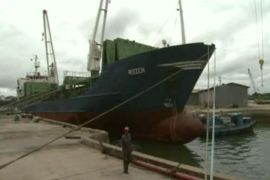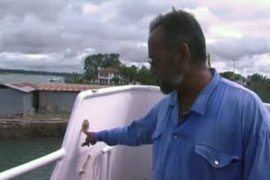Piracy cuts off Somalia aid
Relief supplies struggling to reach starving Somalis as ships come under attack.

 |
| Thousands of tonnes of aid are having to be delivered by road because of the risk of pirate attacks |
The lives of thousands of Somalis who are desperate for food aid are being threatened by heavily armed pirates operating off Africa’s east coast.
The United Nations World Programme has called for international action to tackle piracy saying the flow of relief supplies into the country is under severe threat as some ships are refusing to sail because of the fear of attck.
Keep reading
list of 4 items‘Mama we’re dying’: Only able to hear her kids in Gaza in their final days
Europe pledges to boost aid to Sudan on unwelcome war anniversary
Birth, death, escape: Three women’s struggle through Sudan’s war
At a warehouse in Mombassa, Kenya thousands of tonnes of food are waiting to be transported to the the thousands of Somalia’s displaced by conflict, famine and floods.
But the aid is being held up by the pirates as the seas around the Horn of Africa become too dangerous to risk the shipment. Five vessels and about 50 seamen are currently being held hostage off the coast.
Road transport, although costly and time consuming, has now become the most reliable way to deliver the much needed aid.
“We are highly dependant on sea transport and in a way that becomes difficult because eventually we will run into serious problems. And in all fairness, maybe not so much the WFP will run into serious problems but the people of Somalia will run into serious problems,” Peter Goosens, Somalia director for the World Food Programme, told Al Jazeera.
Hail of bullets
The Rozen, a UN chartered vessel, was recently released after being held by pirates for 42 days.
Priyaki Pereira, the vessel’s captain, showed Al Jazeera the holes made when the ship came under a hail of bullets during the hijacking.
 |
| The captain of the Rozen points to bullet holes in his vessel after it was hijacked |
It was the sixth time that a vessel belonging to Karim Kudrati, the owner of the Rozen, had been seized by pirates and he is considering whether to stop sending them to the country.
“These are very difficult people, not understanding at all. It took us quite a bit of time to get the release of the vessel and the crew,” he said.
Piracy has become an almost daily occurence off Somalia and security experts say that the practice of paying ransom for the return of vessels and crews has made piracy a lucrative trade.
The highest ransom to have been is said to have been around $2.5 million, and the pirates are so well connected that they receive the money outside Somalia with little difficulty.
Seamen’s associations and aid agencies are questioning why international organisations are not doing more to solve the problem.
“If the Islamic Courts did it for six months … why not the Somali transitional government, the African Union, the Kenyan government, the Yemen government?” Andrew Mwangura from the International Seafarers Association asked.
In the meantime the problem continues to get worse and the International Maritime Bureau has issued a warning to all vessels to avoid Somalia’s coast.